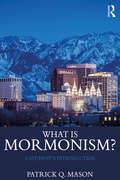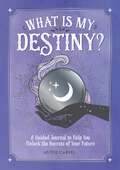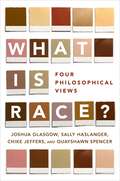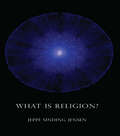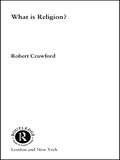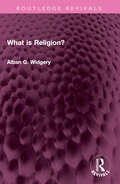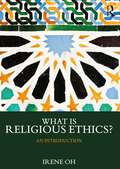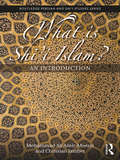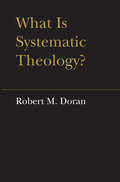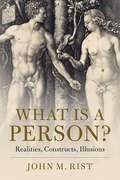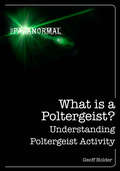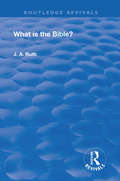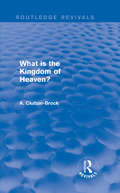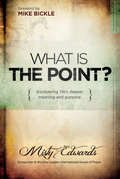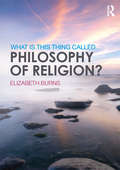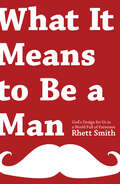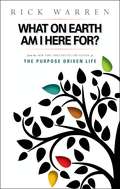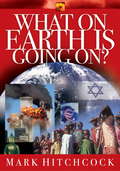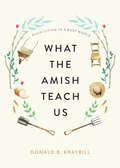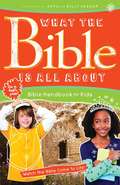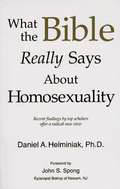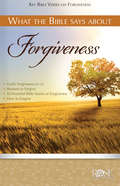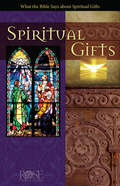- Table View
- List View
What is Mormonism?: A Student's Introduction (What is this thing called Religion?)
by Patrick Q. MasonWhat is Mormonism? A Student’s Introduction is an easy-to-read and informative overview of the religion founded by Joseph Smith in 1830. This short and lively book covers Mormonism’s history, core beliefs, rituals, and devotional practices, as well as the impact on the daily lives of its followers. The book focuses on the Church of Jesus Christ of Latter-day Saints, the Salt Lake City-based church that is the largest and best-known expression of Mormonism, whilst also exploring lesser known churches that claim descent from Smith’s original revelations. Designed for undergraduate religious studies and history students, What is Mormonism? provides a reliable and easily digestible introduction to a steadily growing religion that continues to befuddle even learned observers of American religion and culture.
What is My Destiny?: A Guided Journal to Help You Unlock the Secrets of Your Future
by Astrid CarvelThis guided journal contains everything you need to learn the skills of the clairvoyant and decipher messages from the universeThe ability to foresee our future is something we all long for, and with the help of this guided journal you’ll find yourself harnessing your psychic abilities in no time. From naeviology to numerology, tasseography to tarot and everything in between, this book will be your ultimate guide to fortune telling.Discover the fascinating history behind different divination techniques and how to tap into your own magical abilities with step-by-step instructions and thought-provoking questions. Packed with activities, methods and space to log your interpretations and findings, this book will help you develop your psychic gifts and discover your true path.Learn how to:Analyze the lines and formations of your palmCreate your own dowsing rods and master the art of rhabdomancyInterpret the meaning behind your dreamsDecipher your birth chartYour destiny awaits!
What is Race?: Four Philosophical Views
by Sally Haslanger Joshua Glasgow Chike Jeffers Quayshawn SpencerAcross public discourse, in the media, politics, many branches of academic inquiry, and ordinary daily interactions, we spend a lot time talking about race: race relations, racial violence, discrimination based on race, racial integration, racial progress. It is fair to say that questions about race have vexed our social life. But for all we speak about race, do we know what race is? Is it a social construct or a biological object? Is it a bankrupt holdover from a time before sophisticated scientific understanding and genetics, or can it still hold up in biological, genetic, and other types of research? Most fundamentally, is race real? In this book, four prominent philosophers and race theorists debate how best to answer these difficult questions, applying philosophical tools and the principles of social justice to cutting-edge findings from the biological and social sciences. Each presents a distinct view of race: Sally Haslanger argues that race is a socio-political reality. Chike Jeffers maintains that race is not only political but also, importantly, cultural. Quayshawn Spencer pursues the idea that race is biologically real. And Joshua Glasgow argues that either race is not real, or if it is, it must be real in a way that is neither social nor biological. Each offers an argument for their own view and then replies to the others. Woven together, the result is a lively debate that opens up numerous ways of understanding race. Above all, it is call for sophisticated and principled discussion of something that significantly permeates our lives.
What is Religion?
by Jeppe Sinding JensenReligious belief is one of the most pervasive and ubiquitous characteristics of human society. Religion has shadowed and illuminated human lives since primitive times, shaping the world views of cultures from isolated tribes to vast empires. Starting from the premise that religion is a concept which can be analysed and compared across time and cultures, What is Religion? brings the most up-to-date scholarship to bear on humankind’s most enduring creation. The book opens with a brief history of the idea of religion, then divides the study of religion into four essential topics - types, representations, practices, and institutions – and concludes with a final, eye-opening chapter on religion today. Packed with case studies from a wide range of religions, past and present, What is Religion? offers a very current, comprehensive, yet intellectually challenging overview of the history, theories, practices, and study of religion. Accessible, wide-ranging, engaging, and short, What is Religion? is written primarily for undergraduate students in the study of religion, but it will also be invaluable for students of anthropology, history, psychology, sociology, and theology as well as anyone interested in how and why humans came and continue to be religious.
What is Religion?
by Robert CrawfordWe all know what religion is - or do we? Confronted with religious pluralism and cultural diversity, it manifests itself in many forms. What is Religion? serves not only as an introduction to the different belief systems flourishing throughout the modern world, but asks us to consider how the very boundaries of faith might be drawn now and in the future. How might religion interact with political ends, or permeate culture, society and everyday life? Is the post-secular world in thrall to 'religions' of its own kind - materialism, humanism, medicine, science? And what logic separates 'common-sense' or academic knowledge from the immutable but unstable boudaries of faith? Which is the more certain? What does it mean to believe?Combining clear accounts of contemporary global religious practice with an incisive philosophical interrogation of the dynamics and aims of belief, What is Religion? offers a fresh and wide-ranging introduction to the perennial human questions of ritual, faith, ethics and salvation.
What is Religion? (Routledge Revivals)
by Alban G. WidgeryFirst Published in 1953 What is Religion provides an understanding of religious faith which embraces all of the great and enduring religions. In the process it strips off the irrelevant and inconsequential which every religion accumulates in the course of time, and gets in back of rigid formulations of faith to the primary experiences of the single religious man. Through its detailed consideration of world faiths runs an appealing and consistent philosophy of religion for everyman. Alban Widgery’s aim throughout is constructive, with the purpose of showing religion as supreme in life and of defending its beliefs against forms of antireligious thought. He maintains that the view he presents is more true of religion as it has been in history and also to the general conditions of mankind. This book is a must read for scholars and researchers of philosophy of religion and religion in general.
What is Religious Ethics?: An Introduction (What is this thing called Religion?)
by Irene OhWhat is Religious Ethics? An Introduction is an accessible and informative overview to major themes and methods in religious ethics. This concise and lively book demonstrates the relevance and importance of ethics based in religious traditions and describes how scholars of religious ethics think through moral problems. Combining an issues-based approach with a model of studying ethics religion-by-religion, this volume examines pressing topics through a variety of belief systems—Hinduism, Buddhism, Jainism, Judaism, Christianity, Islam, and Sikhism—while also importantly spotlighting Indigenous communities. Engaging case studies invite readers to consider the role of religions with regard to issues such as: CRISPR Vegetarianism Nuclear weapons Women’s leadership Reparations for slavery What is Religious Ethics? is a reliable and easily digestible introduction to the field. With chronologically structured chapters, discussion questions, suggestions for further reading, and interviews with scholars of religious ethics, this is an ideal guide to those approaching the study of religious ethics for the first time.
What is Shi'i Islam?: An Introduction (Routledge Persian and Shi'i Studies #3)
by Mohammad Ali Amir-Moezzi Christian Jambet<p>For the public at large Shi’ism often implies a host of confused representations, suggesting more often than not obscurantism, intolerance, political violence and other ignominies running hot or cold in response to world events. In fact for many people, Shi’ism stands for "radical Islam", or – worse – "Islamic terrorism". In some respects, nothing is more familiar than Shi’ism, and yet nothing is more misunderstood. For some twenty years the media have increased their coverage of the phenomenon. Never, or only rarely, do they formulate the question we ask here: what is Shi’ism? What is this belief that inspires millions of people dispersed throughout the world? <p>This book provides a broad based introduction to Shi’i Islam. It examines what the Shi’i believe, how they see themselves and how they view the world. It includes a thorough examination of doctrine, philosophy, the Shi’i approach to the Qur’an and the historical evolution of Shi’ism as a branch of Islam. Too often, and too quickly, the conclusion is drawn that Shi’ism is a marginal heretical sect, fundamentally alien to the deeper truth of the great religion of Islam, thrust by historical accident onto the political stage. Shi’ism either speaks the truth of Islam, meaning that it is a truth of terror, or it is entirely foreign to Islam and, therefore, merits outright rejection, as Islamic fundamentalists and some individuals repeatedly claim. This book intends to explain why such common misunderstandings of Shi’ism have taken root. <p>Written in an accessible format and providing a thorough overview of Shi’ism, this book will be an essential text for students and scholars of Islamic Studies or Iranian Studies.</p>
What is Systematic Theology?
by Robert Doran, S.J.In his classic work Method in Theology, Bernard Lonergan left many questions unanswered in regard to his treatment of systematics. In What Is Systematic Theology? Robert M. Doran attempts to articulate and respond to these questions. Doran begins by accepting four emphases presented by Lonergan concerning systematics: first, that its principal function is the hypothetical and analogical understanding of the mysteries of faith; second, that it should begin with those mysteries of faith that have received dogmatic status; third, that it must proceed in the 'order of teaching' rather than the 'order of discovery'; and last, that it must be explanatory rather than merely descriptive. He then addresses questions that are raised by each of these emphases. What Is Systematic Theology? is the most thorough attempt undertaken to date to advance Lonergan's program for systematics, fully in the spirit of his work but addressing issues that he left to others. Doran's idea of a core set of meanings for systematics – or a 'unified field structure' – is highly original, as is the integration of the systematic ideal and contemporary historical consciousness.
What is a Person?: Realities, Constructs, Illusions
by John M. RistIn this book, John M. Rist offers an account of the concept of 'person' as it has developed in the West, and how it has become alien in a post-Christian culture. He begins by identifying the 'Mainline Tradition' about persons as it evolved from the time of Plato to the High Middle Ages, then turns to successive attacks on it in the seventeenth and eighteenth centuries, then proceeds to the 'Five Ways' in which the Tradition was savaged or distorted in the nineteenth century and beyond. He concludes by considering whether ideas from contemporary philosophical movements, those that combine a closer analysis of human nature with a more traditional metaphysical background may enable the Tradition to be restored. A timely book on a theme of universal significance, Rist ponders whether we persons matter, and how we have reached a position where we are not sure whether we do.
What is a Poltergeist?: Understanding Poltergeist Activity (The Paranormal)
by Geoff HolderThe author of Poltergeist Over Scotland embarks on an in-depth study of the characteristics that imbue the paranormal world&’s &“noisy ghosts.&” What Is a Poltergeist? is an introduction to the mysterious phenomenon examining the theories and presenting the latest research evidence for poltergeist activity. In trying to define a poltergeist, author Geoff Holder ponders such questions as: Are they the restless souls of the dead? Demons? Witches&’ familiars? Household spirits? Mysterious earth energies? Unknown powers of the mind? Or hoaxes? This ebook takes the well-known poltergeist phenomena—the movement of objects by invisible forces, the noises, the eruptions of fire, water and electrical disturbance—and maps them against changing ideas and beliefs. The author presents the latest theories and research evidence in his search for answers.What is a Poltergeist? is part of The Paranormal, a series that resurrects rare titles, classic publications, and out-of-print texts, as well as publishes new supernatural and otherworldly ebooks for the digital age. The series includes a range of paranormal subjects from angels, fairies, and UFOs to near-death experiences, vampires, ghosts, and witchcraft.
What is the Bible? (Routledge Revivals)
by J.A. RuthFirst published in 1904, this volume questioned whether the Bible is in its entirety the literal Word of God. The author’s strong background in evangelical Christianity led them to question numerous theological experts and ministers on the topic and conclude that the Bible is as purely and entirely a human production as any other work of literature. Ruth argues instead that humanity’s knowledge of God has come about through developing the faculties with which God has endowed them and that the Bible is a history of humanity’s discovery of God. First considering whether the Bible can be considered the Word of God, the author moves on to cover topics including the evolution of Hebrew monotheism, the Bible canon, contraditions and miracles.
What is the Father Like? a Devotional Look at How God Cares for His Children
by W. Phillip Kellera beautiful devotional, written as a love letter from God to His children expressing His attributes.
What is the Kingdom of Heaven? (Routledge Revivals)
by A. Clutton-BrockWritten as the First World War was finally drawing to a close, A. Clutton-Brock’s reflections on the Kingdom of Heaven examine this challenging theological concept in light of the great religious, political and moral uncertainties thrown up by the conflict. In particular, Clutton-Brock contends that historically Christian orthodoxy has not sufficiently emphasised the role of the Kingdom in salvation, given its importance in the ministry and teaching of Christ. To preserve a religious vision capable of interacting with the modern, industrial world, Christian orthodoxy must carefully consider the scope and importance of political practice, the role of the individual in the realisation of the Kingdom, and the profound implications of reconciling the facts of the universe with the most sincerely held beliefs.
What is the Point?: Discovering Life's Deeper Meaning and Purpose
by Misty EdwardsEverybody lives. Everybody dies... So then, what IS the point? What is the purpose of life? It is the question all of us have--or will have eventually. It may be the most important question you can ask, because how you answer it determines everything about you. In What Is the Point?, Misty Edwards tackles the difficult questions of finding meaning in seasons of success and failure, smallness and greatness, pain and pleasure as we live lives that are, in the end, not of this world. To find the purpose of life, we must deal with eternity and come to real conclusions not only about ourselves but also about God. We have to get caught up in His story in order to see ours. This is what will make our lives worth living today.
What is this thing called Philosophy of Religion?
by Elizabeth BurnsWhat is this thing called Philosophy of Religion? grapples with the core topics studied on philosophy of religion undergraduate courses including: the meaning of religious language, including 20th century developments the nature of the Divine, including divine power, wisdom and action arguments for the existence of the Divine challenges to belief in the Divine, including the problems of evil, divine hiddenness and religious diversity believing without arguments arguments for life after death, including reincarnation. In addition to the in-depth coverage of the key themes within the subject area Elizabeth Burns explores the topics from the perspectives of the five main world religions, introducing students to the work of scholars from a variety of religious traditions and interpretations of belief. What is this thing called Philosophy of Religion? is the ideal introduction for those approaching the philosophy of religion for the first time, containing many helpful student-friendly features, such as a glossary of important terms, study questions and further reading.
What it Means to be a Man: God's Design for Us in a World Full of Extremes
by Rhett SmithWe hear the story of David and Goliath and wonder, &“Do we have what it takes to slay the giant?&”Men today are confronted with many different expectations of who they&’re supposed to be and what role they should be filling. By looking at history, the clichés of manhood, and what intimacy with God looks like, this short book will help men (and women) rethink what it means to be a man in today&’s culture.Counselor and pastor Rhett Smith works through tough questions like: How can men look up to role models without following their flaws?Is it possible to strike a balance between passivity and aggression? How can men speak up, find intimacy, and take care of others without neglecting themselves?When Christ calls us to follow Him, He paves a path that is different than our cultural expectations, a path that leads us to a relationship with Him and to true knowledge of what it means to be a man.
What it Means to be a Man: God's Design for Us in a World Full of Extremes
by Rhett SmithWe hear the story of David and Goliath and wonder, &“Do we have what it takes to slay the giant?&”Men today are confronted with many different expectations of who they&’re supposed to be and what role they should be filling. By looking at history, the clichés of manhood, and what intimacy with God looks like, this short book will help men (and women) rethink what it means to be a man in today&’s culture.Counselor and pastor Rhett Smith works through tough questions like: How can men look up to role models without following their flaws?Is it possible to strike a balance between passivity and aggression? How can men speak up, find intimacy, and take care of others without neglecting themselves?When Christ calls us to follow Him, He paves a path that is different than our cultural expectations, a path that leads us to a relationship with Him and to true knowledge of what it means to be a man.
What on Earth Am I Here For? Purpose Driven Life
by Rick WarrenAn evangelistic booklet based on the first three chapters of The Purpose Driven® Life.
What on Earth is Going on?
by Mark HitchcockAs sensationalists and skeptics wreak havoc with the country's emotions, prophecy expert Mark Hitchcock provides a much-needed definition of what is meant by "signs of the times. " Hitchcock discusses the current interest in prophecy caused by the 9/11 attack, presents Jesus' own forecast for the future of the world, and details five major global developments today that discernibly signal Christ's coming. This balanced, concise overview of the real signs of the times will clarify Christ's instructions challenging his followers to be alert in the final days. Readers will easily find and absorb the information they need to prepare for His return. From the Trade Paperback edition.
What the Amish Teach Us: Plain Living in a Busy World
by Donald B. KraybillWhat do the traditional plain-living Amish have to teach twenty-first-century Americans in our hyper-everything world? As it turns out, quite a lot!It sounds audacious, but it's true: the Amish have much to teach us. It may seem surreal to turn to one of America's most traditional groups for lessons about living in a hyper-tech world—especially a horse-driving people who resist "progress" by snubbing cars, public grid power, and high school education. Still, their wisdom confirms that even when they seem so far behind, they're out ahead of the rest of us. Having spent four decades researching Amish communities, Donald B. Kraybill is in a unique position to share important lessons from these fascinating Plain people. In this inspiring book, we learn intriguing truths about community, family, education, faith, forgiveness, aging, and death from real Amish men and women. The Amish are ahead of us, for example, in relying on apprenticeship education. They have also out-Ubered Uber for nearly a century, hiring cars owned and operated by their neighbors. Kraybill also explains how the Amish function in modern society by rejecting new developments that harm their community, accepting those that enhance it, and adapting others to fit their values. Pairing storytelling with informative and reflective passages, these twenty-two essays offer a critique of modern culture that is provocative yet practical. In a time when civil discourse is raw and coarse and our social fabric seems torn asunder, What the Amish Teach Us uproots our assumptions about progress and prods us to question why we do what we do.Essays include:1. Riddles: Negotiating with Modernity2. Villages: Webs of Well-Being3. Community: Taming the Big "I"4. Smallness: Bigness Ruins Everything5. Tolerance: A Light on a Hill6. Spirituality: A Back Road to Heaven7. Family: A Deep and Durable Bond8. Children: At Worship, Work, and Play9. Parenting: Raising Sturdy Children10. Education: The Way It Should Be11. Apprenticeship: An Old New Idea12. Technology: Taming the Beast13. Hacking: Creative Bypasses14. Entrepreneurs: Starting Stuff15. Patience: Slow Down and Listen16. Limits: Less Choice, More Joy17. Rituals: A Natural Detox18. Retirement: Aging in Place19. Forgiveness: Pathway to Healing20. Suffering: A Higher Plan21. Nonresistance: No Pushback22. Death: A Good Farewell
What the Bible Is All About: Bible Handbook for Kids
by Frances BlankenbakerWhat the Bible Is All About Handbook for Kids, based on Dr. Henrietta Mears' classic What the Bible is All About handbook, is a kid friendly, visually exciting resource designed to help children, tweens and younger teens. Children will read and understand Scripture's revelation of God and His great plan of the ages to save the world. Teachers and parents alike will appreciate this resource's appeal to young believers
What the Bible Really Says About Homosexuality
by Daniel A. HelminiakThe author considers each Scripture which is commonly held to condemn homosexuality--Genesis 19, Leviticus 18, 1 Timothy, 1 Corinthians, Romans, Matthew 5, 18. He then considers them in terms of historical and cultural understanding. Finally, he draws reasoned conclusions for today. Whether the reader agrees with the scholarship set forth in this book, the commentary is a must-read for every Christian and Jew. The book is easy to read even when considering the Greek and Hebrew language. The descriptions of the various methods of Bible interpretation are explained simply and clearly. Never does the author leave the reader wondering about his agenda; he is honest and straightforward about his background, his church work, and his understanding of the Scriptures he is studying. This book would make an excellent Bible study for anyone who is pondering the question of homosexuality in relation to faith practices.
What the Bible Says About Forgiveness
by Rose PublishingWhat the Bible Says About ForgivenessKey biblical principles about forgiveness. Answers questions including: What is forgiveness? Why do we need forgiveness? Why do we need to forgive others? Why is forgiving enemies tied to whether God will forgive us? 6 Ways to use this Forgiveness ebookFor --* personal use* discipleship* new believer's class* small group study or Sunday school class* divorce, addiction, and abuse recovery groups * "basics of the faith" course.Why buy?* Easy to read. Full-color, packed with fascinating charts and diagrams.*Attractive. Designed for the VISUAL learner.* Fast. This 14-page ebook is perfect for the busy person who doesn't have time to read long books.
What the Bible Says About Spiritual Gifts
by Rose PublishingThis best-selling Spiritual Gifts Pamphlet explains the spiritual gifts in the Bible and includes a Spiritual Gifts Quiz to help people know their gifts.This Spiritual Gifts booklet explains each of the gifts of the Holy Spirit and what they mean. When you became a Christian, the Holy Spirit gave you spiritual gifts to build up fellow believers, both in your own church and worldwide. This pamphlet defines spiritual gifts, and describes the differences between the biblical gifts. The Spiritual Gifts Test helps you identify your spiritual gifts, and explains how to use your gifts to benefit others. Each gift of the Spirit is vital and none is more important than others. No matter what your giftedness is, you play an important role in strengthening the church.Did You Know? 63% of Christians Don't Know Their Spiritual GiftsA recent Barna study showed that nearly two-thirds of Christians don't know their spiritual gift(s), don't think they have a gift at all, or claim to have a gift that is not actually biblical.Most Christians know something about Spiritual Gifts, but many don't realize how important they are. Believers are given Spiritual Gifts to contribute to the growth of the church. Spiritual Gifts are important because Scripture says that the church needs all of the gifts working together to help build the Body of Christ. Every believer counts! This pamphlet includes a Spiritual Gifts Questionnaire to determine which gift(s) you might have.The Holy Spirit gives spiritual gifts to Christians to help build the life and ministry of the Church. Yet, a large number of Christians do not use or even recognize their spiritual gift. Rose Publishing's Spiritual Gifts pamphlet will help you learn how important Spiritual Gifts are and how to develop the gift(s) the Holy Spirit has given you. Topics in the Spiritual Gifts pamphlet include --* A self-test "Spiritual Gifts Questionnaire" to determine which gift or gifts you may have.* Description of each gift and how to develop it more as you minister to other believers.Use for* Individual study* Discipleship* Small Group or Sunday School class* Christian School* Homeschoolers* New Believers' class* Church libraryStudy Questions for Personal Use or Small Groups:* Read pages 2-4: Based on page 2, what are the purposes of the gifts? These days many churches have paid staff; so why would the God give each believer a gift for the church? Why are these gifts important to all believers?* See page 3: Some gifts are very dramatic and visible and others are quiet and don't attract much attention. What is the main purpose of these gifts? Why do people need to be involved with other Christians, rather than becoming isolated? Scripture says we must appreciate each person's gift even if it is not very showy. How might you recognize the gifts that other believers have?* See page 4 and the 8 biblical ways that Holy Spirit works in our lives: The Holy Spirit is actively at work in the church with the purpose of glorifying Christ and helping the body of Christ (believers in the church) become more mature. Look at the list: Pick two ways the Holy Spirit acts and why they are important to the church. What would happen if these did not happen? How might you help carry out these priorities in your church?* Read all of page 5 and then go back to the first paragraph. If the Holy Spirit provides the life to the body, how do the members "keep it moving"? Later in the Spiritual Gifts pamphlet, each gift will be described, but based on these four lists of spiritual gifts from Scripture, why do you think such a wide variety of gifts is given to the church? Pick any two gifts and tell how (in your opinion) they fit into the Holy Spirit's priorities on page 4.* Read page 6-7: Christians in every type of church agree on what the spiritual gifts are, but not all Christians agree on precisely how and when they are to be used. Look at Paul's warning at the bottom of page 6 (taken from 2 Corinthians 12:12-26) about not being arrogant but showing concern for each member of the body (each person) so that the
